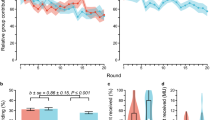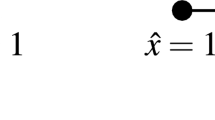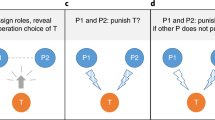Abstract
Theoretical and empirical research highlights the role of punishment in promoting collaborative efforts1,2,3,4,5. However, both the emergence and the stability of costly punishment are problematic issues. It is not clear how punishers can invade a society of defectors by social learning or natural selection, or how second-order free-riders (who contribute to the joint effort but not to the sanctions) can be prevented from drifting into a coercion-based regime and subverting cooperation. Here we compare the prevailing model of peer-punishment6,7,8 with pool-punishment, which consists in committing resources, before the collaborative effort, to prepare sanctions against free-riders. Pool-punishment facilitates the sanctioning of second-order free-riders, because these are exposed even if everyone contributes to the common good. In the absence of such second-order punishment, peer-punishers do better than pool-punishers; but with second-order punishment, the situation is reversed. Efficiency is traded for stability. Neither other-regarding tendencies or preferences for reciprocity and equity, nor group selection or prescriptions from higher authorities, are necessary for the emergence and stability of rudimentary forms of sanctioning institutions regulating common pool resources and enforcing collaborative efforts.
This is a preview of subscription content, access via your institution
Access options
Subscribe to this journal
Receive 51 print issues and online access
$199.00 per year
only $3.90 per issue
Buy this article
- Purchase on Springer Link
- Instant access to full article PDF
Prices may be subject to local taxes which are calculated during checkout



Similar content being viewed by others
References
Fehr, E. & Gächter, S. Cooperation and punishment in public good experiments. Am. Econ. Rev. 90, 980–994 (2000)
Rockenbach, B. & Milinski, M. The efficient interaction of indirect reciprocity and costly punishment. Nature 444, 718–723 (2006)
Gächter, S., Renner, E. & Sefton, M. The long-run benefits of punishment. Science 322, 1510–1512 (2008)
Henrich, J. et al. Costly punishment across human societies. Science 312, 1767–1770 (2006)
Herrmann, B., Thoeni, C. & Gächter, S. Antisocial punishment across societies. Science 319, 1362–1367 (2008)
Fehr, E. & Gächter, S. Altruistic punishment in humans. Nature 415, 137–140 (2002)
Gardner, A. & West, S. A. Cooperation and punishment, especially in humans. Am. Nat. 164, 753–764 (2004)
Egas, M. & Riedl, A. The economics of altruistic punishment and the maintenance of cooperation. Proc. R. Soc. B 275, 871–878 (2008)
Fehr, E. & Rockenbach, B. Detrimental effects of sanctions on human altruism. Nature 422, 137–140 (2003)
Boyd, R., Gintis, H., Bowles, S. & Richerson, P. The evolution of altruistic punishment. Proc. Natl Acad. Sci. USA 100, 3531–3535 (2003)
Fowler, J. H. Altruistic punishment and the origin of cooperation. Proc. Natl Acad. Sci. USA 102, 7047–7049 (2005)
Nakamaru, M. & Iwasa, Y. The evolution of altruism and punishment: role of the selfish punisher. J. Theor. Biol. 240, 475–488 (2006)
Lehmann, L., Rousset, F., Roze, D. & Keller, L. Strong reciprocity or strong ferocity? A population genetic view of the evolution of altruistic punishment. Am. Nat. 170, 21–36 (2007)
Boyd, R. & Richerson, P. J. Punishment allows the evolution of cooperation (or anything else) in sizable groups. Ethol. Sociobiol. 13, 171–195 (1992)
Yamagishi, T. The provision of a sanctioning system as a public good. J. Pers. Soc. Psychol. 51, 110–116 (1986)
Ostrom, E. Governing the Commons: The Evolution of Institutions for Collective Action (Cambridge Univ. Press, 1990)
Hauert, C., Traulsen, A., Nowak, M. A. & Brandt, H. H. &. Sigmund, K. Via freedom to coercion: the emergence of costly punishment. Science 316, 1905–1907 (2007)
Maynard Smith, J. & Szathmary, E. The Major Transitions in Evolution (Oxford Univ. Press, 1997)
Frank, S. A. Mutual policing and repression of competition in the evolution of cooperative groups. Nature 377, 520–522 (1995)
Levin, S. A. (ed.) Games, Groups, and the Global Good (Springer, 2009)
Falk, A., Fehr, E. & Fischbacher, U. in The Drama of the Commons (eds Ostrom, L. et al.) 157–191 (National Academy, 2002)
Mathew, S. & Boyd, R. When does optional participation allow the evolution of cooperation? Proc. R. Soc. B 276, 1167–1174 (2009)
Boyd, R., Gintis, H. & Bowles, S. Coordinated punishment of defectors sustains cooperation and can proliferate when rare. Science 328, 617–620 (2010)
Orbell, J. H. & Dawes, R. M. Social welfare, cooperator’s advantage, and the option of not playing the game. Am. Sociol. Rev. 58, 787–800 (1993)
Hauert, C., De Monte, S., Hofbauer, J. & Sigmund, K. Volunteering as a Red Queen mechanism for cooperation. Science 296, 1129–1132 (2002)
Semmann, D., Krambeck, H. J. & Milinski, M. Volunteering leads to rock–paper–scissors dynamics in a public goods game. Nature 425, 390–393 (2003)
Kiyonari, T., Barclay, P., Wilson, M. & Daly, D. Second order punishment in one-shot prisoner’s dilemma. Int. J. Psychol. 39, 329–334 (2004)
Gürerk, O., Irlenbush, B. & Rockenbach, B. The competitive advantage of sanctioning institutions. Science 312, 108–111 (2006)
Ertan, A., Page, T. & Putterman, L. Who to punish? Individual decisions and majority rule in mitigating the free rider problem. Eur. Econ. Rev. 53, 495–511 (2009)
Kosfeld, M., Riedl, A. & Okada, A. Institution formation in public goods games. Am. Econ. Rev. 99, 1335–1355 (2009)
Acknowledgements
K.S. acknowledges TECT I-104 G15, A.T. thanks the Emmy Noether programme of the DFG and C.H. thanks NSERC (Canada).
Author information
Authors and Affiliations
Contributions
All authors were involved in the design and analysis of the model. H.D.S. and C.H. ran the simulations, A.T. and C.H. did the numerical analysis, and K.S. wrote the paper.
Corresponding author
Ethics declarations
Competing interests
The authors declare no competing financial interests.
Supplementary information
Supplementary Information
This file contains Supplementary Methods, Supplementary Figure 1 with legend, Supplementary Data and References. (PDF 217 kb)
Rights and permissions
About this article
Cite this article
Sigmund, K., De Silva, H., Traulsen, A. et al. Social learning promotes institutions for governing the commons. Nature 466, 861–863 (2010). https://doi.org/10.1038/nature09203
Received:
Accepted:
Published:
Issue Date:
DOI: https://doi.org/10.1038/nature09203
This article is cited by
-
Discipline and punishment in panoptical public goods games
Scientific Reports (2024)
-
Engineering Optimal Cooperation Levels with Prosocial Autonomous Agents in Hybrid Human-Agent Populations: An Agent-Based Modeling Approach
Computational Economics (2024)
-
Constraints on cooperation shape hierarchical versus distributed structure in human groups
Scientific Reports (2023)
-
Evolutionary Games and Applications: Fifty Years of ‘The Logic of Animal Conflict’
Dynamic Games and Applications (2023)
-
Does Spending More Always Ensure Higher Cooperation? An Analysis of Institutional Incentives on Heterogeneous Networks
Dynamic Games and Applications (2023)
Comments
By submitting a comment you agree to abide by our Terms and Community Guidelines. If you find something abusive or that does not comply with our terms or guidelines please flag it as inappropriate.



